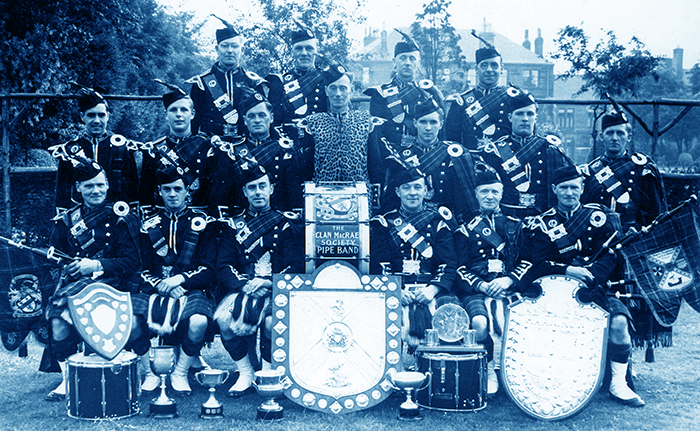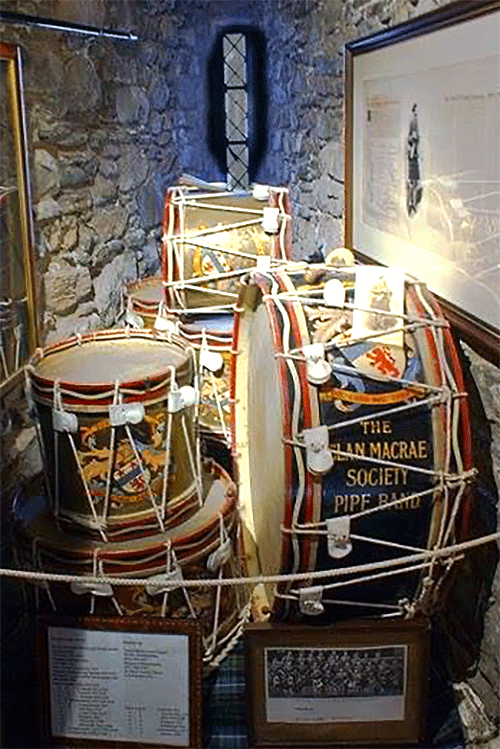
During 1967 the unrest within the ranks of the band continued and it was clear a number of members had decided to call it a day. However, to maintain continuity, the group waited till after the last competition of the season before amicably departing in as civilised a manner as was possible in the circumstances.
The members were pipers James (Jimmy) MacLeod, Eddie McLellan, Finlay MacDonald, Hugh MacInnes, Donald MacLeod and Leading Drummer Ronnie Annan and Bass Drummer, Lorimer Annan.

By Iain Duncan
Gordon Craig, a drummer with the band since the end of 1962, took over as leading tip under P/M Andy Bell. Going into 1968 the band was earmarked for downgrading to Grade 2 by the Advisory Committee of the SPBA. However, it looks like they successfully appealed this and remained Grade 1. In July 1970, Gordon became disillusioned at the band’s leadership direction and left.
Later that year they made a little history being the first ever band to play a medley competition piece at Cowal. But difficulties continued. At the end of the 1971 season, gradings were frozen by the SPBA for the upcoming Scottish World Festival Tattoo and Inter-Continental Championship in Toronto in August, 1972. By virtue of their grading the MacRae were invited to participate.
At some stage during the off-season Andy Bell stepped down as pipe major and was succeeded by Robert Clark, a piper with Shotts and previously P/M of Newmains & District. When, at the end of the 1972 season, the band was downgraded to Grade 2, Robert stepped aside and it was taken over by John Finlay, formerly a piper with Muirhead & Sons.
Coincident with this, the Anchor Mills band from Paisley, which had struggled during 1972 to recruit sufficient pipers, decided to disband entirely, leaving an operational drum corps (under Leading Drummer John MacInnes). The MacRae made a successful approach to the drum corps to join them for the forthcoming 1973 season.
The band had also recruited Joe Logan as the new Leading Drummer; Joe was a drummer from the Alex Duthart era at Shotts. The MacRae continued holding practices in St. John’s Primary School and they were intense. It was quite clear that John and Joe were fully committed to having a successful competition season; they won first prize in Grade 2 at the ’73 Worlds at Dam Park, Ayr.
This and other results gave the band a new air of confidence and practices during the winter season were going well… but the members were dealt a stunning blow when, in April, 1974, John Finlay announced his intention to resign with immediate effect. It was decided that the incumbent Pipe Sergeant, Hugh Gibson, would take over for the coming season.
The band struggled to get anywhere near the results of 1973, although the drum corps ended on a high by winning the drumming prize at Dunblane, the final competition of the season. In September the band was invited to the Braemar Games and had the honour of playing for Her Majesty the Queen and members of the Royal Family. Unbeknown to the band members this would be their last public performance.
Records going back to 1948 show that contrary to popular belief, the MacRae band was pretty much self-sufficient: raising funds independently from competition prize money, engagements, many BBC broadcasts, prize draws and concerts. Financial support had never been provided by the Society but by Captain John and Lady Dorothy MacRae of Conchra, this financial support intermittent, targeting special purchases such as capes and feather bonnets and the occasional injection of cash to the general uniform continuity fund. Band income was now proving inadequate, placing it in a dire dilemma. With its future distinctly uncertain members considered disbandment.
It was during this crisis period a glimmer of hope came along, if not for the Clan MacRae, at least for the band members. The band secretary, David Berry, an employee of Rolls-Royce at Hillington, Glasgow, heard that the company was keen to revive their pipe band and following joint discussions it was agreed that the era of the Clan MacRae Society Pipe Band would end and forthwith become Rolls-Royce (1971) Limited Pipe Band.

To legitimise this end of an era, and to acknowledge the decades of valued support provided by the MacRae family, band members arranged to meet with a senior member of the Society for their token endorsement. It was with much sadness and regret that John MacRae gave his full support to the move, acknowledging it to be in the best interests of the bandsmen.
His last request was that the band’s original, specially emblazoned, rope tension drums (left) be taken to Eilean Donan Castle and laid up in perpetuity in the traditional manner of a battlefield altarpiece. And so, along with other band memorabilia, there they remain to this day, a fitting tribute to fifty proud years of the Clan MacRae Society Pipe Band.
- For earlier excerpts of this history type Clan MacRae into the ‘Search’ field above.
The Bagpiper’s Handbook…a must have for all pipers


























Following the morphing of the Clan MacRae into Rolls Royce Pipe Band, and despite having some excellent pipers and pipe majors including Hughie Gibson, Jim Henderson and Tommy Johnston, the band never achieved the same success as with John Finlay, although the RR band regularly featured in the top 5 at many of the majors.
Iain – this was a very interesting series of articles on one of the great bands of our time. It also clarifies how the band ended and puts any doubts regarding the MacRae/Skye interface to bed. It’s a fine addition to the social history of our hobby. Thanks for that.
BTW did you know that a few years down the line there was a Rolls Royce/Kilbarchan merger too? I guess that’s another story